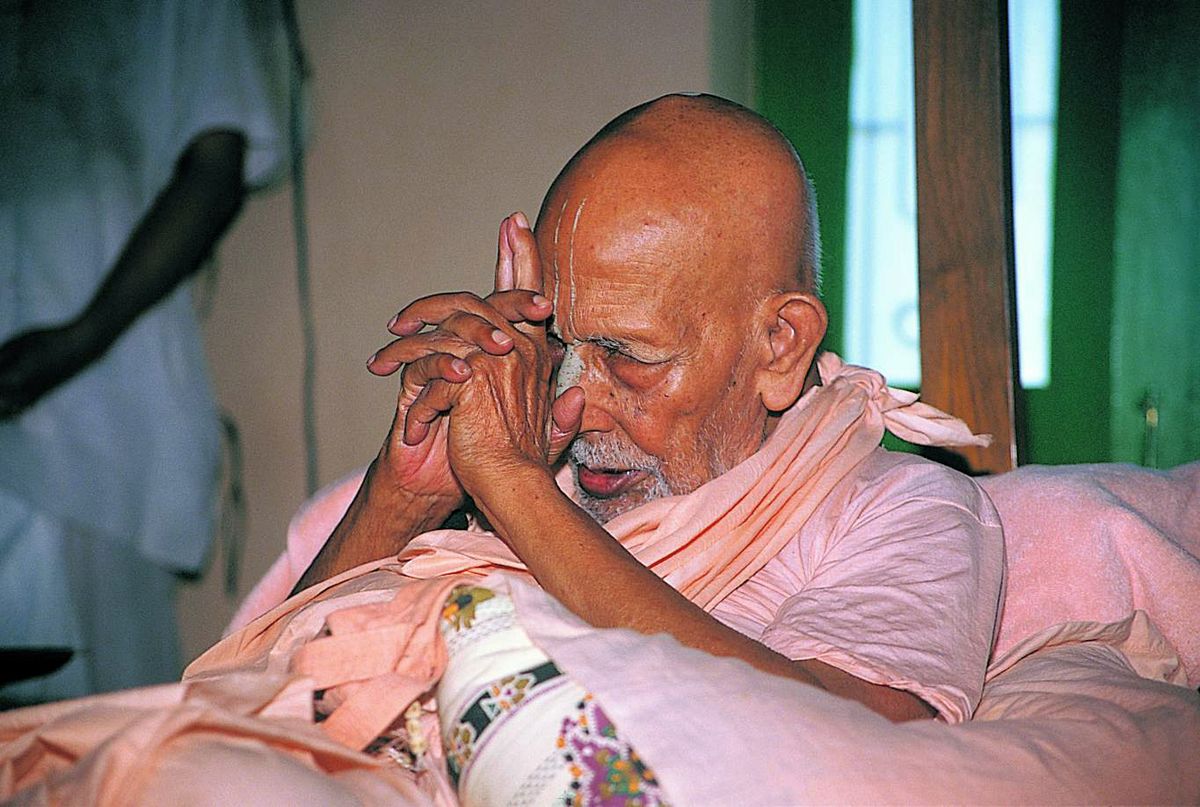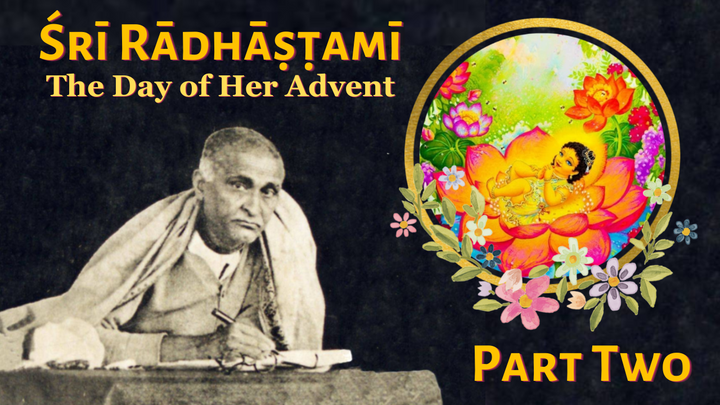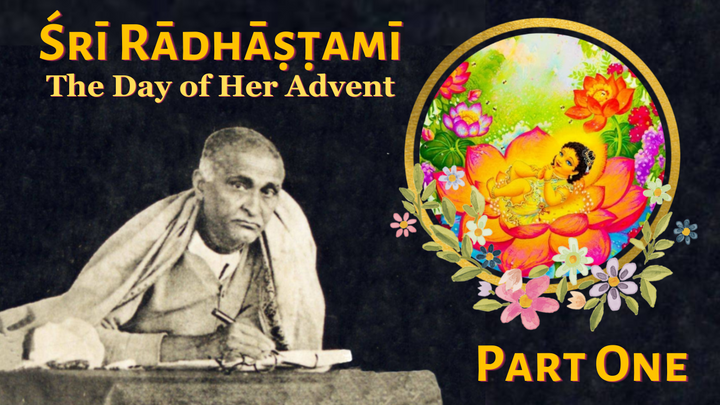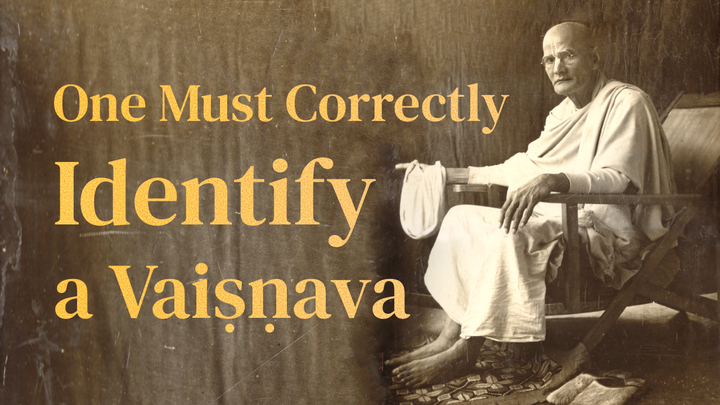Guru-sevā

Tomorrow marks the sacred 125th Vyāsa-pūjā day of nitya-līlā-praviṣṭa oṁ viṣṇupāda Śrī Śrīmad Bhakti Pramoda Purī Gosvāmī Mahārāja. In honor of this auspicious occasion, I am posting here a profound and sobering article authored by him, titled "Guru-sevā." If you would like to join me for a live reading of this article in one hour, you can access it through this link:
In the previous post a couple days ago, I mentioned some ideas for dates we could complete our reading of Śrī Caitanya-bhāgavata and start a program for going through all the kirtans of Śrīla Bhaktivinoda Ṭhākura. Yesterday, I opted to go with the third and later option, which is as follows:
- Conclude our reading of Śrī Caitanya-bhāgavata on May 3, 2024, the disappearance day of Śrīla Vṛndāvana dāsa Ṭhākura.
- Commence the Śrīla Bhaktivinoda Ṭhākura kirtan program on May 8, 2024, the appearance day of Śrīla Gadādhara Paṇḍita.
This arrangement will allow us ample time to nicely read about and honor all the many auspicious Vaiṣṇava festival days, like this one-week reading from a biography of Śrīla Bhakti Pramoda Purī Gosvāmī Mahārāja titled "A Life of Devotion" (download here), authored by Devamayī Mātājī. Yesterday, we read Chapter 1, today we read Chapter 2, and tomorrow onwards we will continue with the remaining chapters on my YouTube channel. I am conducting this reading in lieu of our regular Śrī Caitanya-bhāgavata sessions, so you can find detailed instructions on how to join on the Caitanya-bhāgavata page.
And now, on to the article by Śrīla Bhakti Pramoda Purī Gosvāmī Mahārāja.
Guru-sevā
by Śrī Śrīmad Bhakti Pramoda Purī Gosvāmī Mahārāja
The Benefit of Sincere Śrī Guru-sevā
Śrī Bhagavān bestows His mercy upon the jīva by appearing before him in the form of śrī guru. Other than serving śrī guru’s lotus feet, there is no way for the jīva to achieve the Lord’s mercy. The indirect, secondary result of serving śrī guru (śrī guru-seva) is that all anarthas, such as lust and anger, which are unfavourable for the development of śuddha-bhakti and which originate from the three modes of material nature, are easily conquered. The direct result of śrī guru-sevā is that one attains service at Śrī Kṛṣṇa’s lotus feet.
yasya sākṣād bhagavati
jñāna-dīpa-prade gurau
martyāsad-dhīḥ śrutaṁ tasya
sarvaṁ kuñjara-śaucavat
Śrīmad-Bhāgavatam (7.15.26)
The meaning of this verse is that those who maintain the ill-conception that śrī guru is an ordinary mortal will find that all their efforts to recite mantras and hear and meditate upon the purports of scripture ultimately bear no fruit. They are like the elephant who takes his bath only to immediately roll in the mud again. Śrī guru is pratyakṣa-bhagavān, the directly perceivable form of the Supreme Lord, and it is he who bestows the light of transcendental knowledge upon the jīva.
The Mysterious Truth of Śrī Guru-tattva
Śrīla Viśvanātha Cakravartī Ṭhākura has said: “sākṣād bhagavatīti bhagavad-aṁśa-buddhir api gurau na kāryeti bhāvaḥ – never even consider śrī gurudeva to be a partial expansion of the Lord (bhagavad-aṁśa)”, and,“sākṣād-dharitvena samasta-śāstrair, uktas tathā bhāvyata eva sadbhiḥ, kintu prabhor yaḥ priya eva tasya, vande guroḥ śrī-caraṇāravindam – All scriptures and saints declare that śrī gurudeva is the direct manifestation of Śrī Hari Himself. Śrī gurudeva is in fact that selfsame viṣaya-vigraha – Śrī Hari, who is the object of the devotees’ love – but in His aspect of āśraya-vigraha, the dear most devotee of Kṛṣṇa, or the abode of love for Him. The form of śrī gurudeva is inconceivably one with Śrī Kṛṣṇa and different from Him (Śrī Gurvaṣṭakam 7).”
Truly, the worshipful object of our service, Śrī Bhagavān, has personally appeared before me in the form of śrī guru. Śrī guru is Śrī Bhagavān’s own manifestation as the eternal servant of Kṛṣṇa (nitya-sevaka-vigraha) and at the same time he is Śrī Bhagavān’s most dear one. All this is to be carefully considered.
Śrīla Viśvanātha Cakravartī Ṭhākura raises the question: “Śrī gurudeva’s own father, children and neighbours consider him to be an ordinary human. Why is it that only his disciples consider him to be parameśvara, the Supreme Lord Himself?” Śrīla Ṭhākura then answers this question himself:
He explains that whether Śrī Bhagavān appears as Yadu-nandana (Śrī Kṛṣṇa) or as Raghu-nandana (Śrī Rāma), He is certainly the Supreme Lord of all creation. Among those who took birth at the time of one of His appearances, some thought of Him as an ordinary human being, but does their opinion factually make Him one?
In the same manner, regardless of what other people may think of śrī gurudeva out of ignorance or according to a worldly relationship with him, his disciples will always consider him to be the non-different manifestation of Śrī Bhagavān.
Śrī Bhagavān Himself has declared:
nanvartha-kovidā brahman
varṇāśrama-vatām iha
ye mayā guruṇā vācā
taranty añjo bhavārṇavam
Śrīmad-Bhāgavatam (10.80.33)
[O brāhmaṇa, among those who adhere to varṇāśrama, they who easily cross beyond the ocean of material existence through the instructions I give as guru are truly knowledgeable in matters of spiritual well-being.]
nāham ijyā-prajātibhyāṁ
tapasopaśamena vā
tuṣyeyaṁ sarva-bhūtātmā
guru-śuśrūṣayā yathā
Śrīmad-Bhāgavatam (10.80.34)
[Not by the ritual worship of ordained brāhmaṇas, nor by austerity, nor by self-restraint, can I, the soul of all-beings, be so satisfied as by faithful service to śrī guru.]
In this world the birth giving father is the first guru, the one who gives brahminical rights and instructions is the second guru, and the one who instructs us in bhagavat-tattva and gives us the dīkṣā-mantra is the third guru. This third guru, the dīkṣā-guru, is indeed the most prominent and venerable. By his grace alone the jīva crosses over the ocean of material existence and attains the fortune of finding the lotus feet of Śrī Bhagavān. Bhagavān Śrī Kṛṣṇa-candra, along with His dear friend Śrī Sudāmā Vipra, resided in the home of their gurudeva. There He exhibited the highest ideal of guru-sevā. Bhagavān Śrī Caitanya-deva also exhibited the same glorious ideal of accepting shelter at the lotus feet of śrī guru (śrī guru-pādāśraya) and rendering service to him.
Pretentious Guru-sevā Will Never Bear Any Real Fruit
With body, mind and words – or with one’s very life, one’s wealth, one’s intelligence and one’s speech – one must whole-heartedly serve śrī guru. That which results in bringing joy to the object of worship (sevya-vastu) is indeed called sevā, but a mere display of service predominantly motivated by the ill-purpose of securing personal gains, worship or fame can never be called sevā.
dīkṣā-kāle bhakta kare ātma-samarpaṇa
sei-kāle kṛṣṇa tāre kare ātma-sama
sei deha kare tāra cid-ānanda-maya
aprākṛta-dehe tā̃ra caraṇa bhajaya
Śrī Caitanya-caritāmṛta (Antya-līlā 4.192-193)
[When the bhakta fully dedicates himself at the time of receiving dīkṣā, Śrī Kṛṣṇa makes him as spiritual as Himself, permeating the bhakta’s body with transcendence and bliss. With his spiritual body, the bhakta then worships Kṛṣṇa’s lotus feet.]
According to this statement compiled by a mahājana (a great devotee and authority), to the extent that someone surrenders himself at the lotus feet of śrī gurudeva, he will be established in dīkṣā according to its actual meaning and he will attain the qualification to render service to the lotus feet of Śrī Kṛṣṇa. On the other hand, if he simply identifies himself with the words ‘initiated disciple’ but neglects śrī guru-sevā, or, on the pretence of performing guru-sevā, if he leads an independent life absorbed in sense-gratification it cannot be accepted that he is actually living a life of devotion or even truly searching for the supreme goal of human life (paramārtha).
Filling the belly of oneself and one’s bodily relatives with alms, wealth or ingredients that have been collected under the pretext of using them for the service of Śrī Bhagavān and His devotees is such an extremely serious offence that simply thinking of such an activity makes one’s whole body tremble in fear. No offence is worse than maintaining one’s livelihood by displaying śrī vigraha for money; selling mahā-prasāda, caraṇāmṛta or nāma-mantra; or professionally discoursing on holy scriptures like the Śrīmad-Bhāgavatam.
Those who identify themselves as disciples cannot defend their identity as “disciple” or guru-dāsa if they live whimsically in transgression of the standards of discipline established by sad-guru and the Vaiṣṇavas, or if they abandon fulfilling the heart’s desire (mano’bhīṣṭa-sevā) of śrī gurudeva and thereafter seek shelter in personal sense-gratification on the pretext of doing sevā and pūjā (ceremonial worship). Their style of living can never be considered pursuant of paramārtha, or transcendence. If one does not precisely follow the orders and instructions of śrī gurudeva, without changing them, one can never do true good to oneself or others.
Real Guru-sevā
We must assemble in an iṣṭa-goṣṭhī and deliberate specifically upon the eternally beneficial instructions, or vāṇī, of śrīla gurudeva that have emanated from his lotus lips or that he has recorded in devotional literatures, published in periodicals and journals, and so on. Accordingly, we must endeavour to fulfil his deepest wishes. This will indeed be called śrī guru-sevā. Otherwise, as in Ekalavya’s case, the efforts of someone who serves guru according to his own whims, without considering whether the guru is satisfied or not, can never be called guru-sevā. Śrī gurudeva never accepts the service rendered by one so arrogant.
Conceited so-called service performed by one whose motive is to compete with the Vaiṣṇavas for personal name and fame as though they were his opponents, or who hankers for disciples and wealth, can never be equivalent to real sevā. On the other hand, what to speak of being free from pride, someone who engages in true sevā, will feel a mood of utter humility rising in his heart day by day, and he will feel himself to be more insignificant than the straw on the street. Along with that, he will become as tolerant as a tree, which never asks for anything yet gives everything; he will become devoid of the desire to be respected by others; and he will develop the tendency to give respect to all. Filled with transcendental humility, he will always be absorbed in chanting the holy name of Kṛṣṇa.
One attains perfection in all types of endeavours exclusively by pleasing śrī gurudeva. By pleasing him one’s perception of difference (bheda) between Śrī Kṛṣṇa’s holy name (śrī kṛṣṇa-nāma), His deity form (śrī kṛṣṇa-vigraha) and His own internal form and nature (śrī kṛṣṇa-svarūpa) will be dispelled and knowledge will awaken within him that the holy name (śrī-nāma) is personally Śrī Kṛṣṇa’s own form of eternity, knowledge and bliss (His sac-cid-ānanda svarūpa). His form is the very embodiment of all transcendental humours, it is eternal, pure and completely liberated, that is to say it is free from even the faintest scent of illusion. When the conception arises that nāma and nāmī, or śrī hari-nāma and Śrī Hari Himself, are non-different, then the ten offences to the holy name will be eradicated and one will become qualified to attain the real mercy of śrī nāma.
The Truly Magnanimous Nature of Śrī Guru
Śrī gurudeva is the non-different manifestation of Śrī Bhagavān. He appears in this material world just to dispel the darkness of ignorance and bestow viśuddha-prema-bhakti (absolutely pure loving devotion) upon the jīvas. Śrī gurudeva, who is the ocean of mercy and who becomes distressed upon seeing the suffering of others, accepts so much pain for the sake of distributing this precious love. For this great treasure, the only price is sincere greed. That invaluable love will never be achieved through mockery. One who displays such mockery, which is completely disrespectful to śrī guru, will suffer in hell for an unlimited period of time.
If without duplicity someone accepts the shelter of the lotus feet of śrī guru, which are the source of fearlessness and freedom from grief, and which are the basis of immortality, then, even if he is sinful, aggressive, a fool, a wretch, poorly behaved, ill behaved, or even the worst behaved person, then śrī guru will never deprive him of mercy. Such a guru never sees the faults of others and always delivers the fallen souls. No one is the friend of our heart like he is. Our sole aspiration, our sole source of life, is his causeless mercy and our unpretentious dedication to him.
The Antithesis of Real Service
Those unfortunate arrogant disciples, who pretentiously display themselves as more knowledgeable than their guru, go as far as trying to rectify śrī gurudeva. They try to change the example he set for proper conduct (ācāra-dhāra) as well as the precepts he propagated (pracāra-dhāra), and they attempt to introduce their own special style of conduct and precepts. Due to the severe aparādha (offence) of disrespectfully considering śrī gurudeva to be an ordinary, mortal being, they bring about their own destruction and pave the way to destruction for many others. Just as it is an aparādha to consider a bona fide guru to be a false one, promoting a false guru as bona fide is equally offensive. None of the endeavours to perform sevā by someone entangled in the aparādha of disrespecting śrī guru can be considered guru-sevā or bhagavat-sevā. This so-called sevā accomplishes nothing more than simply exposing the self-pride of such people.
“Is the service I am rendering being accepted by śrī gurudeva?” This question must be reflected upon at every moment and at every step. Without considering this, the only thing one can accomplish through one’s whimsically motivated activities or use of energy, wealth, intelligence and words, is the momentary gratification of one’s senses. When mimicking the loving service of śrī gurudeva’s dear most associates, through hard work and large donations, is rooted in a spirit of competition and when it is done out of envy by those who are discontented by the glories of others, then it will never be śrī guru-sevā.
In genuine endeavours to perform śrī guru-sevā, envy and arrogance do not exist at all; rather humility is quickly kindled and any intention to cause distress to others is unable to find a place in one’s heart. Then a heart-rending prayer full of intense, earnest pleading for the opportunity to perform sevā will arise: “Will śrī-guru-pāda-padma be merciful upon me, his fallen servant, and accept my service?”
The Greatest Danger for the Jīva
“What is “sevā”?! I will certainly show them! What do they know about sevā? Only I know its real meaning,” This arrogant mentality is completely unfavourable for śrī guru-sevā.
If someone’s heart is full of dispositions that are unfavourable to bhakti, such as enviousness, enmity and violence, then, no matter how much he makes an external display of bhajana, he is certainly deprived of Bhakti-devī’s mercy. As a result of his offences at the lotus feet of Bhakti-devī, attachment to mundane sense-objects will at once manifest in his heart. Thereafter, the tendency to profess himself to be a Vaiṣṇava will manifest, a tendency rooted in the wickedness of fulfilling his desires to enjoy sense-objects on the pretence of serving Śrī Hari, Guru and Vaiṣṇavas. At that time the predilection to remain under the guidance of Vaiṣṇavas and serve them will no longer prevail.
Surely, being cast out of bhakti’s shelter is the only factual disaster for the jīva. The cause of this severe disaster is none other than his offences at the lotus feet of śrī guru and Vaiṣṇavas. As a consequence, the desires to enjoy wealth, women and fame drastically increase within his heart. In fact, according to the logic “yādṛśī bhāvanā yasya siddhir bhavati tādṛśī – the fulfilment of one’s desires upon attaining perfection is in accordance with the thoughts one had during the phase of spiritual practice”, these worldly enjoyments become easily available to such people. However, the unfortunate jīvas cannot understand their own undoing. They simply spend all their time madly engaged in sensual pleasures. They lose all sense of proper conduct in relation to bhakti and become entangled in various forms of ill-behaviour. Thus their hypocrisy and artificiality verily increases.
May the most worshipful śrī guru-pāda-padma, out of his causeless compassion, bestow his mercy upon me so that I may attain the qualification to selflessly serve his lotus feet according to his mano’bhīṣṭa, while remaining in the ānugatya of his dearmost associates.
This is the sole prayer of a fallen soul like me, according to the principle of subservience to the servant of the servant of the servant.
āmi to’ vaiṣṇava, e-buddhi hoile,
amāni nā habo āmi
pratiṣṭhāśa āsi, hṛdaya duṣibe,
hoibo niraya gāmi
Śrī Kalyāṇa-kalpa-taru (3.2.8)
[I will not be free from expectations of honour if I maintain the mentality that “I am a Vaiṣṇava”. Desiring prestige, my heart will become dirty and I will be bound for hell.]
Translated from the monthly Gauḍīya, Year 4, No. 5
CC-BY-SA Rays of The Harmonist No.18 (Kartik 2008)



Comments ()